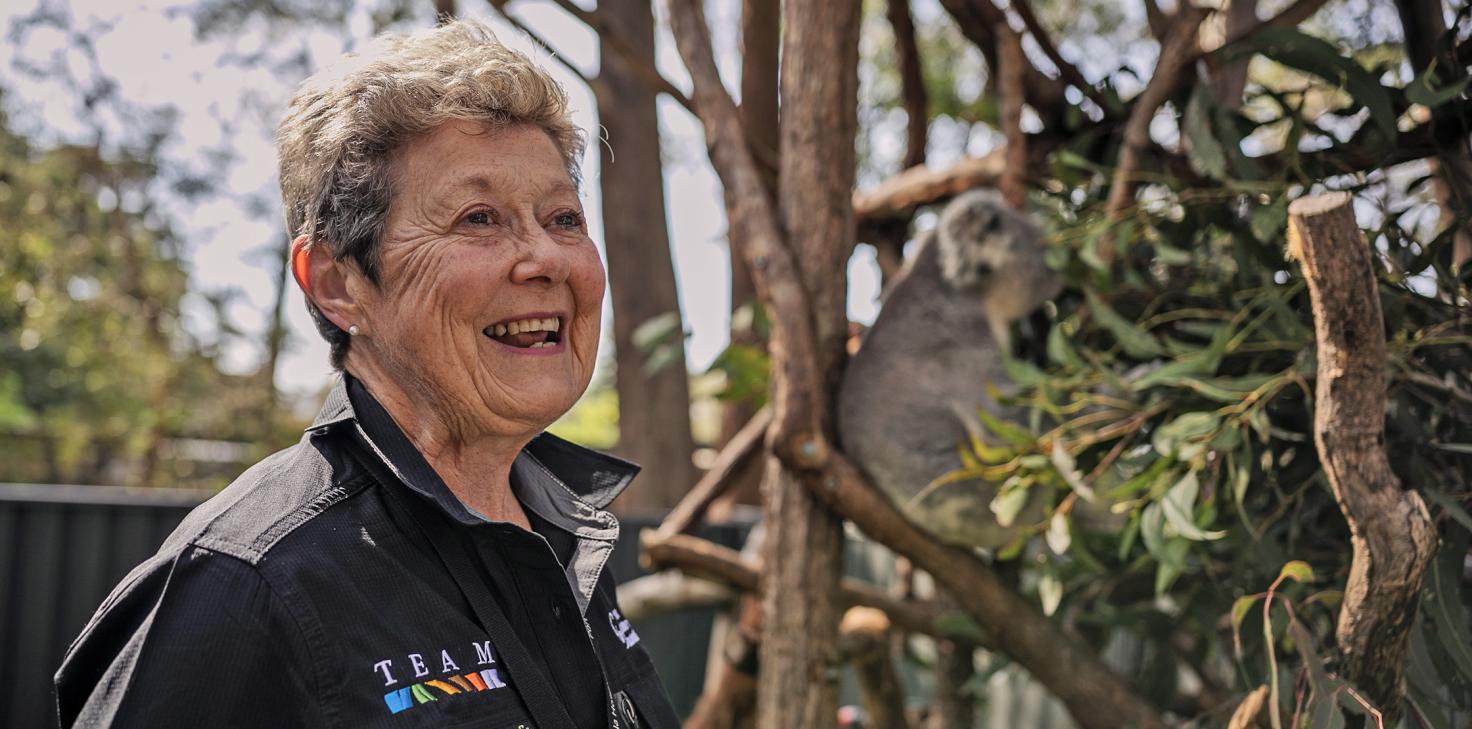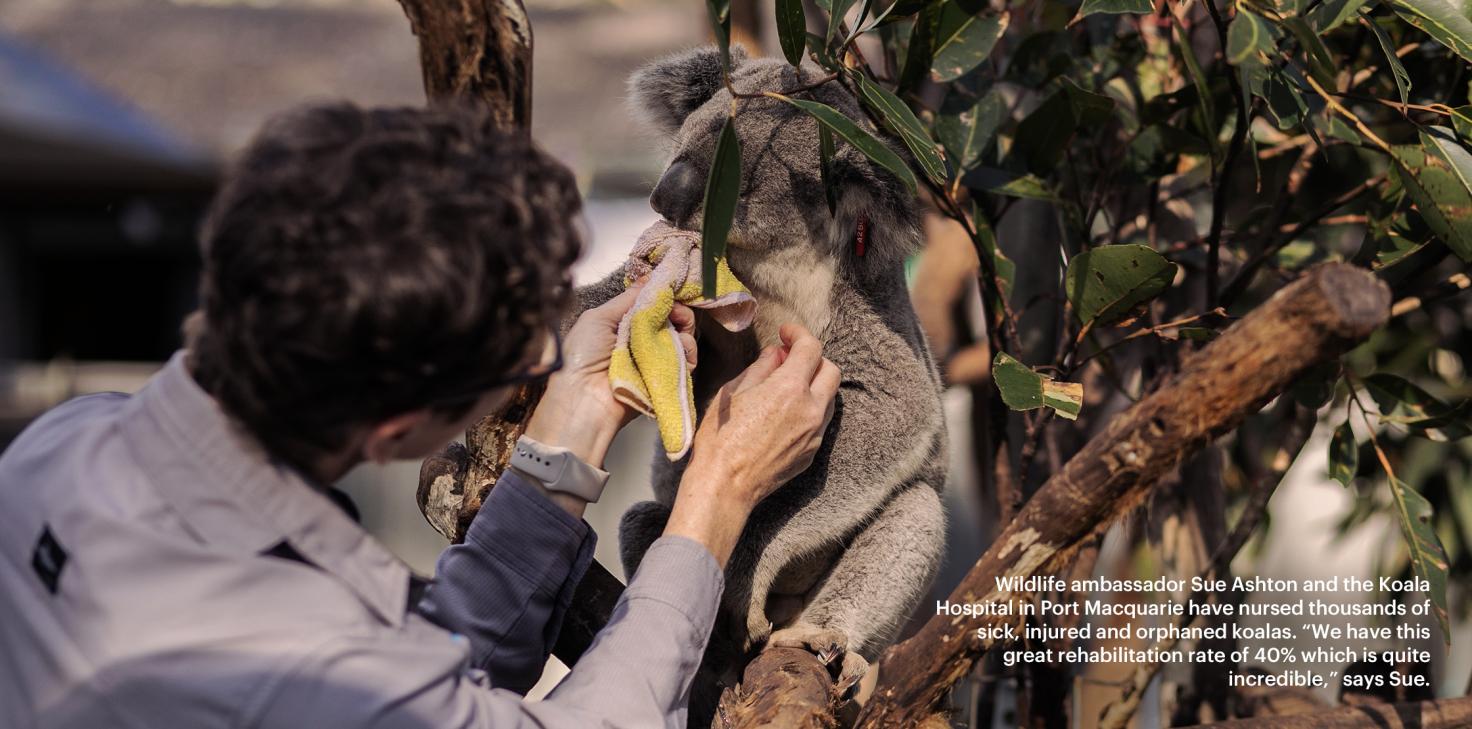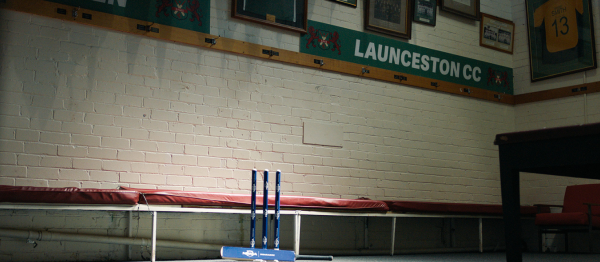25 September 2023
Championing Koala Conservation: One Advocate's Journey of Help
This Moment of Help and healing comes to life on Birpai Land in the soothing sunny climate of Lake Cathie in Northern NSW. It’s where Sue Ashton is nursing an orphaned koala joey called Abai in her very own home.

Abai is one of many sick, injured or orphaned koalas Sue Ashton has seen in her role as Chairperson of Port Macquarie’s Koala Hospital and Koala Conservation Australia (KCA). She’s also an active volunteer for the FAWNA Wildlife Rescue. Through the monumental efforts of Sue, together with KCA’s Board, they have helped a small not-for-profit Koala Hospital become a successful self-funded business, tourist destination and education centre. Raising nearly $8 million through crowdfunding for koala breeding after the Black Summer bushfires, the koala ambassador says this is a critical time for saving our native animals, especially with endangered koalas currently facing extinction in New South Wales.

Right now, Sue is looking after a joey koala in her home bathroom in Lake Cathie after its mother was killed in a car accident. “She’s called Kempsey Abai because we found her in Kempsey and the person that finds her gets to name her. She’s only 1.35 kilos and wouldn't have survived in the wild. She’s very anxious, so she feels safer with one person in-home care. There were a few scratches initially but she trusts me now.”
She's a joy. Last night when I was feeding her, she got really cheeky and decided she'd had enough and started swinging by her arms with her legs dangling down on her gunyah frame. She’s eating leaf now which is fantastic.

Sue’s appreciation for our unique native creatures started when she was a child. A lover of animals and wildlife from a young age, Sue remembers pleading with her mother to attend Sydney’s Royal Easter Show for the sole purpose of visiting the animal section, especially the nursery.
While she would have loved to work with animals professionally, a promising corporate career beckoned, and over the last three decades, Sue has held impressive roles with major Australian and international corporations. When someone reached out to see if she could help with the Koala Hospital, she believed her business acumen could assist with the welfare of our national treasures.
“An acquaintance called seeking volunteer help with the Koala Hospital, and asked if I’d had any experience with media. I was like ‘Yeah, about 32 years.’ I was previously a General Manager of the Commonwealth Bank. I know about business, branding and budgets. The hospital needed to start taking on board business skills and disciplines for it to stay viable. The hospital has now moved from being a small charity to a small business. It has made our capacity for care stronger.”

As far as working with one of Australia’s most iconic native animals, she found herself both bewildered and confronted by her initial experiences.
“I was one of those people who thought I knew about koalas, but then realised I knew very little.”
They have their own personalities and quirks and you can get attached. Working with these animals, it’s impossible not to feel a kindred spirit with them.

Sue laments that while the hospital facility is world-class, the amount of koalas they are tending has halved in recent years. Before Black Summer, the hospital would have cared for up to 250 koalas each year. That number is now closer to 100 and she feels everyone has a part to play in helping the koala population.
“There’s fewer coming to us but that’s because there’s fewer around and it’s terrible,” Sue shares. “People forget that they were here first and we all need to make serious efforts to live together in such a way that it doesn’t keep impacting their lives. There is work we can all do towards their health and survival."

A passionate koala educator, Sue is keen to remind us that koalas are an umbrella species. This means that healthy koalas contribute to better health for other species including gliders, possums and other native creatures. As for what we can do to help contribute to the ongoing survival of our koalas, Sue insists that we must all be proactive.
“We all need to be held to account for the change in their environment. Remember, the breeding period starts at the end of winter so keep in mind that koalas are on the move. If you see a wildlife sign, please slow down and look out. The koala road toll is very high. If you have dogs, lock them up at night so roaming koalas don’t get attacked in yards. If we lost our koalas, it would be just tragic. We need to invest in ways to live safely together and practice them.”
NRMA Insurance is a proud partner of the Koala Hospital and Koala Conservation Society, providing them with financial assistance and regular access to our business support team. To donate or adopt a koala and help ensure their survival, please visit koalahospital.org.au



